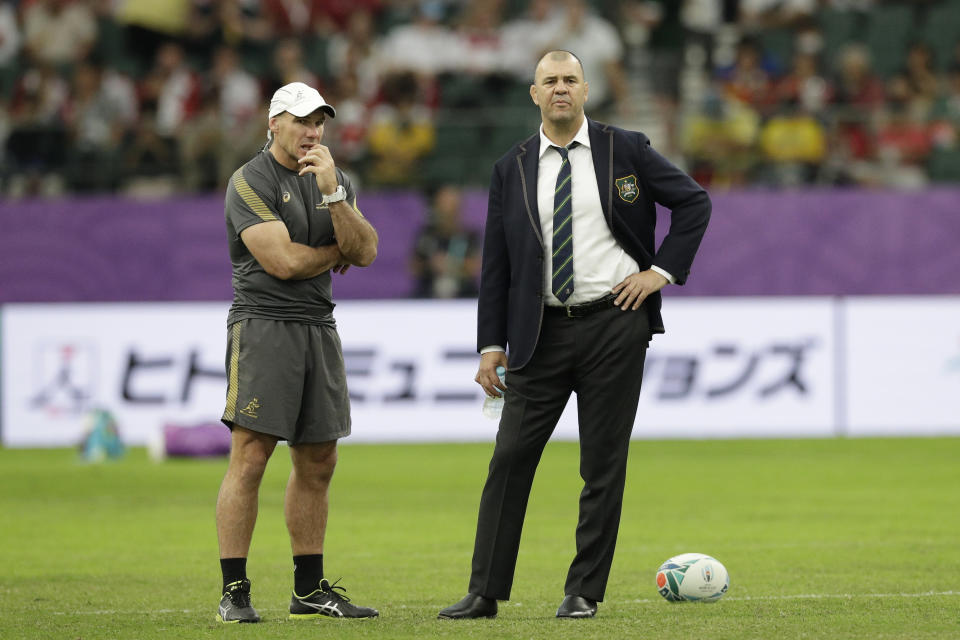Cheika checks out as Wallabies coach, unlamented by some
Michael Cheika stepped down as Wallabies head coach on Sunday much as had been expected, with broadsides at his critics and clumsy attempts at self-justification and buck-passing.
After five difficult years, Cheika might have made an attempt to go out gracefully. But in victory or defeat, grace hasn't really been part of Cheika's make-up.
He turned immediately on his employers — the chairman and chief executive of Rugby Australia — who stood by him in the face of a clamor for his removal by Wallabies fans.
"I think it's no secret that I've pretty much got no relationship with the CEO and not much with the chairman," Cheika said when he announced he wouldn't seek to renew his contract as Australia's head coach after a Rugby World Cup quarterfinal loss to England.
In a diplomatically-worded statement chief executive Raelene Castle said Cheika "cares deeply about the Wallabies and the game of rugby and always set out with the aim of making Wallabies fans proud of the team's performances."
When, in the raw aftermath of the 40-16 loss to England, Cheika chided reporters who questioned him about his future for a failure to show compassion, few Wallabies fans would have felt stirrings of sympathy. Rather there might have been an overwhelming sense of irony that such a plea should have come from a man whose reign was characterized by belligerence.
"Obviously, I got asked the question in the press conference about what is going to happen going forward and at the time I wasn't keen to answer but I always knew the answer in my head," Cheika said.
For the first time since 2007, and only the second time overall, Australia won't feature in the Rugby World Cup semifinals. Defending champion New Zealand, unbeaten since a shock quarterfinal defeat in '07, will take on England for a spot in the final against the winner of the South Africa-Wales semifinal.
Cheika may now pick over the remnants of his coaching reign for some trace of a legacy. He's likely to find little more than fragments; wisps of hope and promise outweighed by frustration, disappointment and failure.
When he took the Wallabies to the World Cup final in 2015 and was named World Rugby Coach of the Year, there were promising signs. But for various reasons, and Cheika's nature is one of those, the Australian team never built on the promise and successes became more and more sporadic. Since the last World Cup, Australia has won only 23 of 52 tests or 44 percent.
It's difficult to say even after five years what was Cheika's vision for the Wallabies; they can't be said to have any distinctive or homegrown style, as they once did, nor an identifiable team ethos.
While he liked to portray himself as relaxed and free-wheeling, Cheika often existed in a siege mentality. Players who didn't conform to his regime often were summarily removed, notably the talented but troublesome flyhalf Quade Cooper.
"If he actually cared about (Australian) rugby he would have (quit) a while ago," Cooper tweeted on hearing of Cheika's decision.
Most coaches build teams around a nucleus of top players, a captain and a group of trusted lieutenants. Four players captained the Wallabies during Cheika's tenure, only two on a long-term basis. Hooker Stephen Moore retired in 2017, leaving a hole. Michael Hooper followed and became one constant in an otherwise turbulent reign.
Cheika had bad luck with injuries, especially to Pocock, and lost his best ball player when fullback Israel Folau was fired this year over his divisive posts on social media.
But it's hard to avoid the conclusion Cheika brought most of his problems on himself. Coaches, like politicians, need a fund of political capital, of public goodwill, to carry them through hard times. If Cheika ever had that fund, he cashed it in years ago.
He was over-sensitive to criticism but not always sensitive to the feelings of fans. His frequent boast that as a rich man he didn't need the Wallabies' job was hardly emollient.
"In five years of being in charge I have loved it," he said. "So there is not emotional toll. I'm no drama queen. I love the ups and downs and that' the way she rolls."
Coaches are often best judged by whether they leave a team in better condition than they found it. Whoever succeeds him will find Australian rugby in a grevous state, losing the struggle among the four varieties of football Down Under for audience share and struggling to retain and develop young players.
___
More AP Rugby World Cup: https://www.apnews.com/RugbyWorldCup and https://twitter.com/AP_Sports



